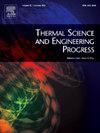基于热分析的co2驱动椰子壳气化动力学和热力学分析
IF 5.4
3区 工程技术
Q2 ENERGY & FUELS
引用次数: 0
摘要
本研究探讨了椰子壳作为合成气生产的潜在原料的热降解和气化行为。综合生物量表征,包括近似值、终值和生化分析,以及估算高热值(HHV),以评估其适宜性。热重分析(TGA)在CO2环境下进行(流速:100 mL/min),温度范围为室温至1000°C,加热速率为10、20和30°C/min。热重分析结果表明,主要的质量损失发生在200 ~ 550℃范围内。采用Kissinger-Akahira-Sunose (KAS)、Tang、Flynn-Wall-Ozawa (FWO)和Starink等转换模型对其动力学和热力学参数进行了评价。计算得到的平均活化能分别为57.066 kJ/mol (FWO)、52.235 kJ/mol (KAS)、52.600 kJ/mol (Starink)和52.184 kJ/mol (Tang),均低于其他常用生物质气化和热解材料的平均活化能。在活化能和焓范围内计算得到的能差为4.68 kJ/mol,表明有利于热力学生成产物。利用Criado主图和Coats-Redfern方法进一步阐明了反应机理和顺序,为研究CO2气氛下椰子壳的气化行为提供了更深入的认识。这些结果突出了椰子壳作为合成气生产经济高效原料的可行性,从而支持了可持续能源技术的进步。本文章由计算机程序翻译,如有差异,请以英文原文为准。
Kinetics and thermodynamics profiling of CO2-driven coconut husk gasification via thermal analysis
This study explores the thermal degradation and gasification behavior of coconut husk as a potential feedstock for syngas production. Comprehensive biomass characterization including proximate, ultimate and biochemical analyses as well as estimating higher heating value (HHV) was conducted to assess its suitability. Thermo-gravimetric analysis (TGA) was conducted under a CO2 environment (flow rate: 100 mL/min) across a temperature range ofroom temperature to 1000 °C, with heating rates of 10, 20, and 30 °C/min. The TGA results indicated that the primary mass loss occurred in temperature range 200 to 550 °C. Kinetic and thermodynamic parameters were evaluated by applying iso-conversional models like Kissinger-Akahira-Sunose (KAS), Tang, Flynn-Wall-Ozawa (FWO) and Starink. The mean activation energy values calculated were 57.066 kJ/mol (FWO), 52.235 kJ/mol (KAS), 52.600 kJ/mol (Starink), and 52.184 kJ/mol (Tang), all of which are lower than those reported for other biomass materials commonly used in gasification and pyrolysis. The calculated energy gap of 4.68 kJ/mol within the activation energy and the enthalpy suggesting conducive thermodynamics to form product. The reaction mechanisms and order were further elucidated using the Criado master plot and Coats-Redfern method, providing deeper insights into the gasification behavior of coconut husk under CO2 atmospheres. These results highlight the viability of coconut husk as an economical and efficient feedstock for syngas production, thereby supporting the advancement of sustainable energy technologies.
求助全文
通过发布文献求助,成功后即可免费获取论文全文。
去求助
来源期刊

Thermal Science and Engineering Progress
Chemical Engineering-Fluid Flow and Transfer Processes
CiteScore
7.20
自引率
10.40%
发文量
327
审稿时长
41 days
期刊介绍:
Thermal Science and Engineering Progress (TSEP) publishes original, high-quality research articles that span activities ranging from fundamental scientific research and discussion of the more controversial thermodynamic theories, to developments in thermal engineering that are in many instances examples of the way scientists and engineers are addressing the challenges facing a growing population – smart cities and global warming – maximising thermodynamic efficiencies and minimising all heat losses. It is intended that these will be of current relevance and interest to industry, academia and other practitioners. It is evident that many specialised journals in thermal and, to some extent, in fluid disciplines tend to focus on topics that can be classified as fundamental in nature, or are ‘applied’ and near-market. Thermal Science and Engineering Progress will bridge the gap between these two areas, allowing authors to make an easy choice, should they or a journal editor feel that their papers are ‘out of scope’ when considering other journals. The range of topics covered by Thermal Science and Engineering Progress addresses the rapid rate of development being made in thermal transfer processes as they affect traditional fields, and important growth in the topical research areas of aerospace, thermal biological and medical systems, electronics and nano-technologies, renewable energy systems, food production (including agriculture), and the need to minimise man-made thermal impacts on climate change. Review articles on appropriate topics for TSEP are encouraged, although until TSEP is fully established, these will be limited in number. Before submitting such articles, please contact one of the Editors, or a member of the Editorial Advisory Board with an outline of your proposal and your expertise in the area of your review.
 求助内容:
求助内容: 应助结果提醒方式:
应助结果提醒方式:


